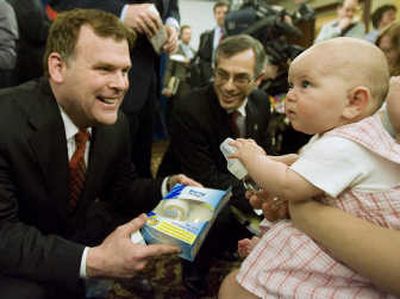Canada bans BPA from baby bottles

WASHINGTON – Canada on Friday became the first country to ban a widely found chemical from use in baby bottles, spurring a leading Democrat in the U.S. Senate to call for legislation that would prohibit use of bisphenol A, or BPA, in a number of common consumer products.
“We have immediately taken action on bisphenol A because we believe it is our responsibility to ensure families, Canadians and our environment are not exposed to a potentially harmful chemical,” said Tony Clement, minister of health.
Clement said the action was based on a review of 150 worldwide studies. “It’s pretty clear that the highest risk is for newborns and young infants,” he said. Wal-Mart Canada began pulling baby products containing BPA from its shelves this week, and the chain said it plans to stop selling products containing BPA in U.S. stores by next year. Playtex said it would offer free non-BPA bottles to parents and stop using BPA in all products by year’s end. Nalgene, the maker of reusable water bottles popular among athletes, said Friday it would discontinue production of bottles made with the chemical and recall products in stores.
The move in Canada adds pressure on U.S. federal regulators to re-examine their positions on BPA, which is suspected of causing breast and prostate cancer, diabetes, hyperactivity and other disorders in laboratory animals. This week, a federal health panel in the United States for the first time expressed concerns about the health effects of BPA.
BPA is used in production of polycarbonate plastic and epoxy linings to add strength and resilience. U.S. manufacturers produce more than 6 billion pounds annually. While many uses pose no risk to consumers, some scientists have worried about the health effects of ingesting low doses of the chemical, which is used in the linings of canned foods as well as bottles and food storage products.
Sen. Charles Schumer, D-N.Y., said Friday he will file a bill to ban BPA from baby products as well as dental sealants and any bottle or container that holds food and drink. “It’s better to be safe than sorry,” he said.
The chemical industry, which believes the safety of BPA is well documented by research, focused on the fact that Canada isn’t banning all products containing BPA.
“The weight of scientific evidence, as assessed by Health Canada and other agencies around the world, provides reassurance that consumers can continue to safely use products made from bisphenol A,” said Steven Hentges, of the American Chemistry Council’s Polycarbonate/BPA Global Group.
But Schumer said that given the many warnings about the dangers of BPA, “we cannot wait to act. If there is any serious risk at all posed by this chemical, it is simply unacceptable to allow Americans, especially vulnerable infants, to come into contact with it.”
Industry groups tried Friday to squelch what they call “scare stories” and panic in the marketplace. “Based on the entire body of scientific evidence, and the findings of the (Food and Drug Administration) and numerous health authorities and researchers, consumers can continue to safely enjoy foods and beverages in the many forms of packaging provided, including those that contain BPA, without changing their purchasing or eating patterns,” said Robert Brackett, chief science officer for the Grocery Manufacturers Association.
The debate over BPA, which has simmered for a decade, grew intense this week after the National Toxicology Program, an office within the National Institutes of Health, acknowledged in a draft report that the chemical might cause cancer and other serious disorders. The chemical mimics estrogen in the human body, scientists say.
Although the office does not regulate BPA, its findings are used by other federal agencies such as the FDA and the Environmental Protection Agency.